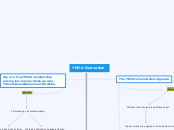YMCA Evaluation
The YMCA's Teen Action Agenda
Poverty
Children left unsupervised after school.
higher chance to engage in risky behavior.
Risky Behavior
drinking.
smoking.
gang violence.
skipping school.
Prevent risky behavior with extra curricular activties.
Extra Curricular Actvities
mentoring programs.
drug prevention programs.
Leadership clubs.
computer literacy classes.
culturally specific curriculums.
recycling and environmental projects
basketball leagues.
Sports and Child Development.
extra-curricular activities
Increases cognitive, behavioral, and social development.
children preform better in school and in social settings.
Use of a free YMCA membership among low-income black women. Translational Behavioral Medicine.
poverty
12-month no-cost membership.
Increased physical activity.
Increase utilization to stay and play.
Improving Outcomes for Urban African American Students.
Poverty
Increase special education referrals.
No Surprise: The Rate of Fatal Child Abuse and Neglect Fatalities Is Related to Poverty.
Poverty
Outcome for fatal child abuse and neglect.
Drug use.
family violence.
A community outreach program for youth within the child welfare system: A grant proposal.
Poverty
Child abuse and neglect.
Decreased cognitive, behavioral, and social development.
Extra curricular activities
Increases Decreased cognitive, behavioral, and social development.
Prevents child abuse and neglect.
